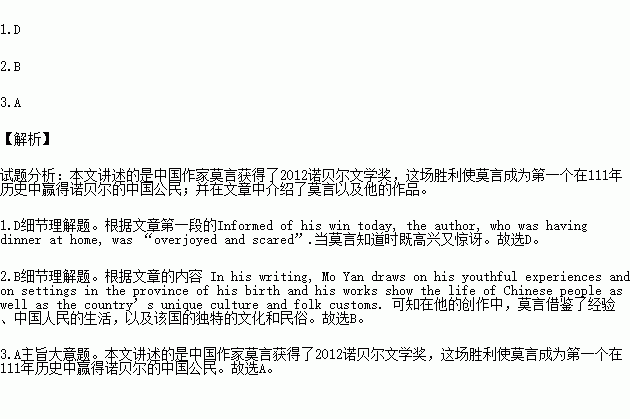题目内容
Chinese writer Mo Yan has won the 2012 Nobel Prize in Literature, announced the Swedish Academy in Stockholm on Thursday. The win makes Mo Yan the first Chinese citizen to win the Nobel in its 111-year history. Informed of his win today, the author, who was having dinner at home, was “overjoyed and scared”.
Born in 1955 to parents who were farmers, Mo Yan — a pen name for Guan Moye, grew up in Gaomi, Shandong province in eastern China. At the age of 12, he left school to work, first in agriculture, later in a factory. In 1976 he joined the army and during this time began to study literature and writing.
He published his first book in 1981, but found literary success in 1987 with Hong Gaoliang Jiazu, which was successfully filmed in the same year, directed by famous Chinese director Zhang Yimou. In his writing, Mo Yan draws on his youthful experiences and on settings in the province of his birth and his works show the life of Chinese people as well as the country’s unique culture and folk customs. Mo Yan is known as a productive writer. In addition to his novels, he has published many short stories and essays on various topics. Despite his social criticism, he is seen in his homeland as one of the most famous contemporary authors. Dozens of his works have been translated into English, French, Japanese and many other languages.
The awarding ceremony has been held on December 10. The winner has won a medal, a personal diploma and a cash award of about $1 million.
1.How did Mo Yan feel when he was told about the news?
A. Excited and proud. B. Worried and cautious.
C. Uncertain and shocked. D. Happy and surprised.
2.One of Mo Yan’s characteristics of writing is that he ________.
A. focuses on social problems in the country
B. writes about topics he is familiar with
C. describes his characters in a unique way
D. explains difficult matters in simple words
3.What’s the best title for this passage?
A. Mo Yan Wins Nobel Prize in Literature
B. An Introduction to Nobel Prize
C. How Mo Yan Gets Nobel Prize
D. A World Famous Writer, Mo Yan

